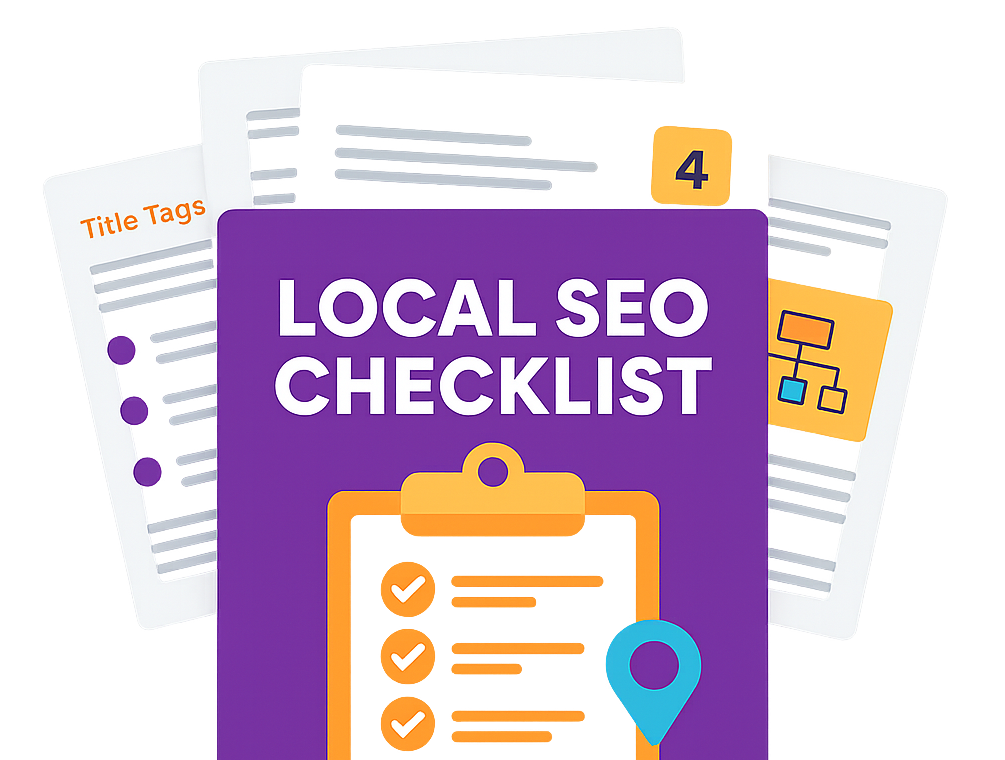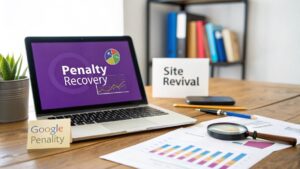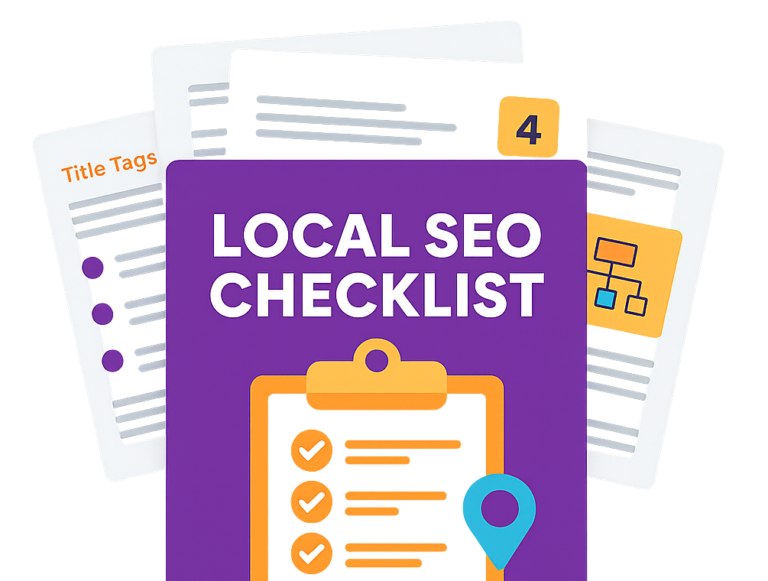Local SEO for solicitors is all about making sure your firm shows up when potential clients in your area are searching for legal help on Google. It’s the difference between being the first name they see and not being seen at all. When someone in your town searches for legal advice, you want your firm to be front and centre.
Why Your Next Client Is Searching Locally
The way people find a solicitor has changed for good. Gone are the days of flicking through the Yellow Pages or relying purely on word-of-mouth. Today, that journey almost always starts with a quick search on a smartphone: ‘family solicitor near me’ or ‘conveyancing solicitor in Manchester’.
This shift means a solid local SEO strategy isn’t just a nice-to-have; it's essential for survival and growth in the UK's crowded legal market. It puts you directly in the path of modern clients, who make decisions based on proximity and what they see online.

The Power of Proximity and Intent
To really grasp why local SEO for solicitors matters so much, you have to understand client intent. When someone includes a location in their search, they aren't just casually browsing. They have a real, often urgent, legal need and are actively looking for an expert nearby to help them.
The numbers back this up. A huge 46% of all Google searches have local intent. Think about that—nearly half of all users are looking for something right in their neighbourhood. This is especially true in the legal field, where trust and the option for a face-to-face meeting still carry a lot of weight.
On top of that, "near me" searches have exploded by over 500% in recent years, proving just how much consumers now rely on proximity. You can dig into more data on local search trends to see just how significant this shift is.
Dominating the Digital High Street
Getting your firm into Google's 'Local Pack'—that box at the top of the search results with a map and three business listings—is the digital equivalent of having the best office on the high street. It gives your firm instant visibility and credibility, connecting you directly with the most promising local enquiries.
A strong local SEO strategy ensures you are not just an option for potential clients, but one of the top options presented to them at the very moment they need you.
Ignoring local search comes with a heavy price. It’s like putting up an 'invisible' sign outside your office. While your competitor down the road is busy fielding calls from clients who found them on Google Maps, your firm, no matter how skilled or experienced, simply doesn't exist online. In today's market, that’s a risk no modern solicitor can afford to take.
Optimising Your Google Business Profile
Think of your Google Business Profile (GBP) as your firm's digital front door. For potential clients in your area, it's often the very first interaction they have with your brand, popping up in Google Search and Maps when they type in "solicitor near me".
Getting this right isn't just about filling in the blanks. A meticulously optimised profile can shift from being a simple listing to a powerful client-generation engine. It builds trust before a prospective client even thinks about clicking through to your website.
Laying the Foundations for Success
First things first: you need to claim and verify your profile. Google has to confirm your firm is a legitimate local business at the address you’ve provided, which usually means waiting for a postcard with a verification code. Once you're verified, you have the keys to the castle and can start the real work.
This is where the detailed stuff begins. Your mission is to give Google as much accurate, compelling information as you can to prove your relevance for local legal searches. A complete profile is a trusted profile, and in the world of local search, trust is everything.
Selecting Your Core Services and Categories
One of the most critical parts of setting up your GBP is picking the right business categories. You’ll start with a primary one, like "Law Firm" or "Legal Services," but the magic is in the details. Add secondary categories that precisely reflect your specialisms.
For instance, you might add:
- Family Law Solicitor if you handle divorce or child custody cases.
- Property Solicitor for conveyancing and real estate law.
- Personal Injury Solicitor if your firm focuses on accident claims.
Choosing the most accurate categories sends a direct signal to Google about the types of cases you handle, helping you show up for highly relevant searches. This is a fundamental piece of any effective local SEO for solicitors campaign.
After sorting your categories, it's time to craft a business description. It needs to be informative for potential clients and optimised for search. Try to naturally weave in key phrases like "expert employment solicitors in Cambridge" or "specialist probate advice." This text helps Google understand the context of your services, but always remember to write for humans first.
Building Trust with Visuals and Interaction
High-quality, professional photos are non-negotiable. They add a much-needed human element and build immediate credibility. Make sure you include clear photos of your office exterior (so clients can find you), a few interior shots, and professional headshots of your team. This simple step makes your firm feel more approachable and established.
But your GBP is more than just a static information board; it's an interactive platform. Use features like Google Posts to share firm updates, highlight a specific service, or publish a brief client success story. These act like mini-blog posts right on your search listing, keeping your profile fresh and telling Google you’re active.
The Google Q&A feature is a goldmine that most firms ignore. Proactively add and answer common questions clients might have. Think along the lines of, "Do you offer a free initial consultation?" or "What are your opening hours?" This not only provides valuable information but also positions you as a helpful authority from the get-go.
To really get the most out of your profile, you need to dig into the deeper strategies. For a more detailed walkthrough, you can learn about comprehensive Google Business Profile optimisation in this guide.
To get your profile content right, you first need to understand what your clients are searching for. The infographic below outlines a typical keyword research workflow, a vital process for finding the terms you should be using in your GBP description and posts.
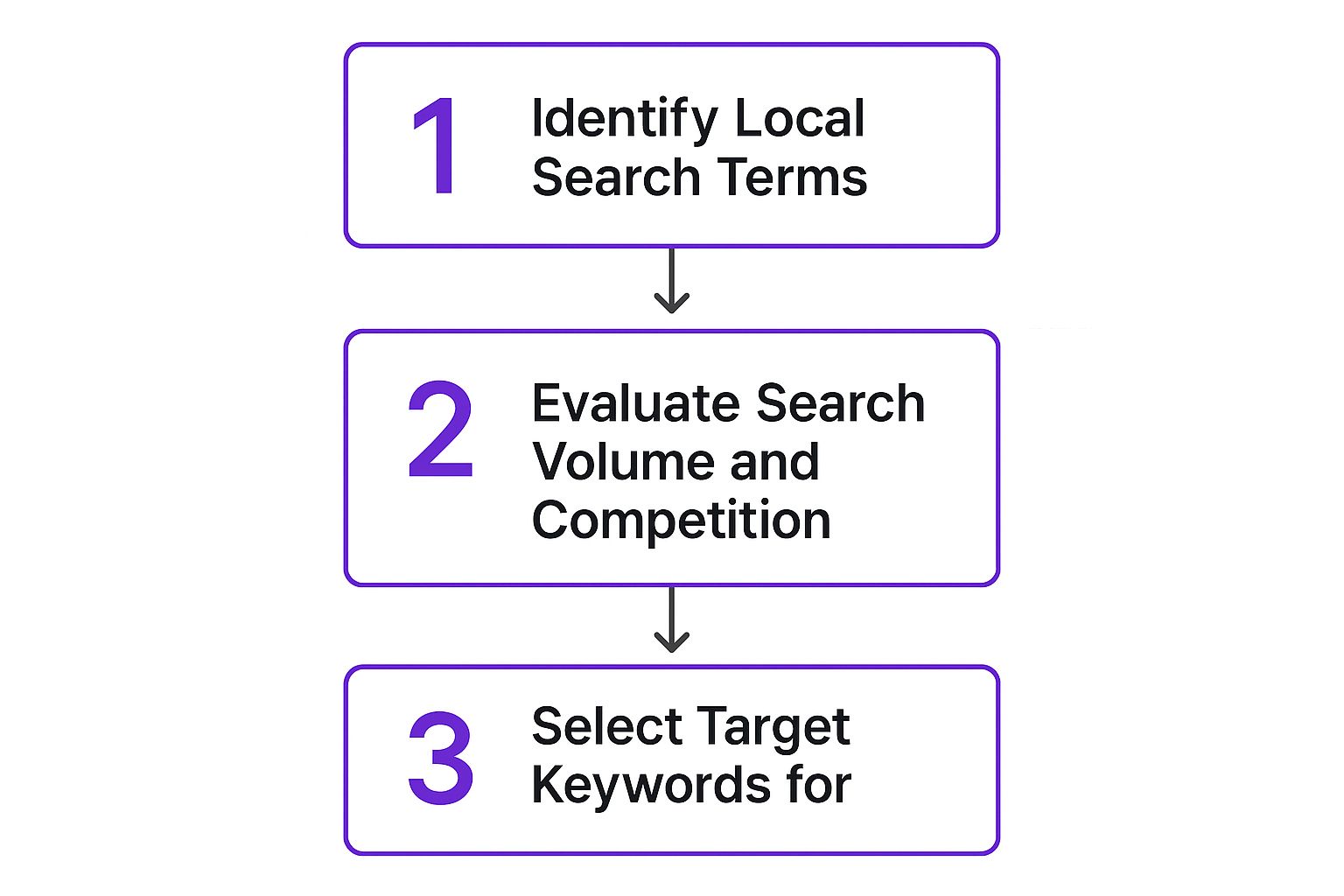
This process shows that effective optimisation starts with knowing what local clients are actually looking for. By completing every section of your profile with care and keeping it updated, you send strong signals to Google that your firm is active, relevant, and the best choice for local clients.
Localising Your Website and Service Pages
Your Google Business Profile is the digital welcome mat, but your website is where potential clients truly decide if your firm is the right one for them. It needs to send crystal-clear signals to both Google and local clients that you are the go-to authority for legal services right there in their community. We call this on-page SEO, and it’s all about weaving local signals throughout your site’s content and structure.
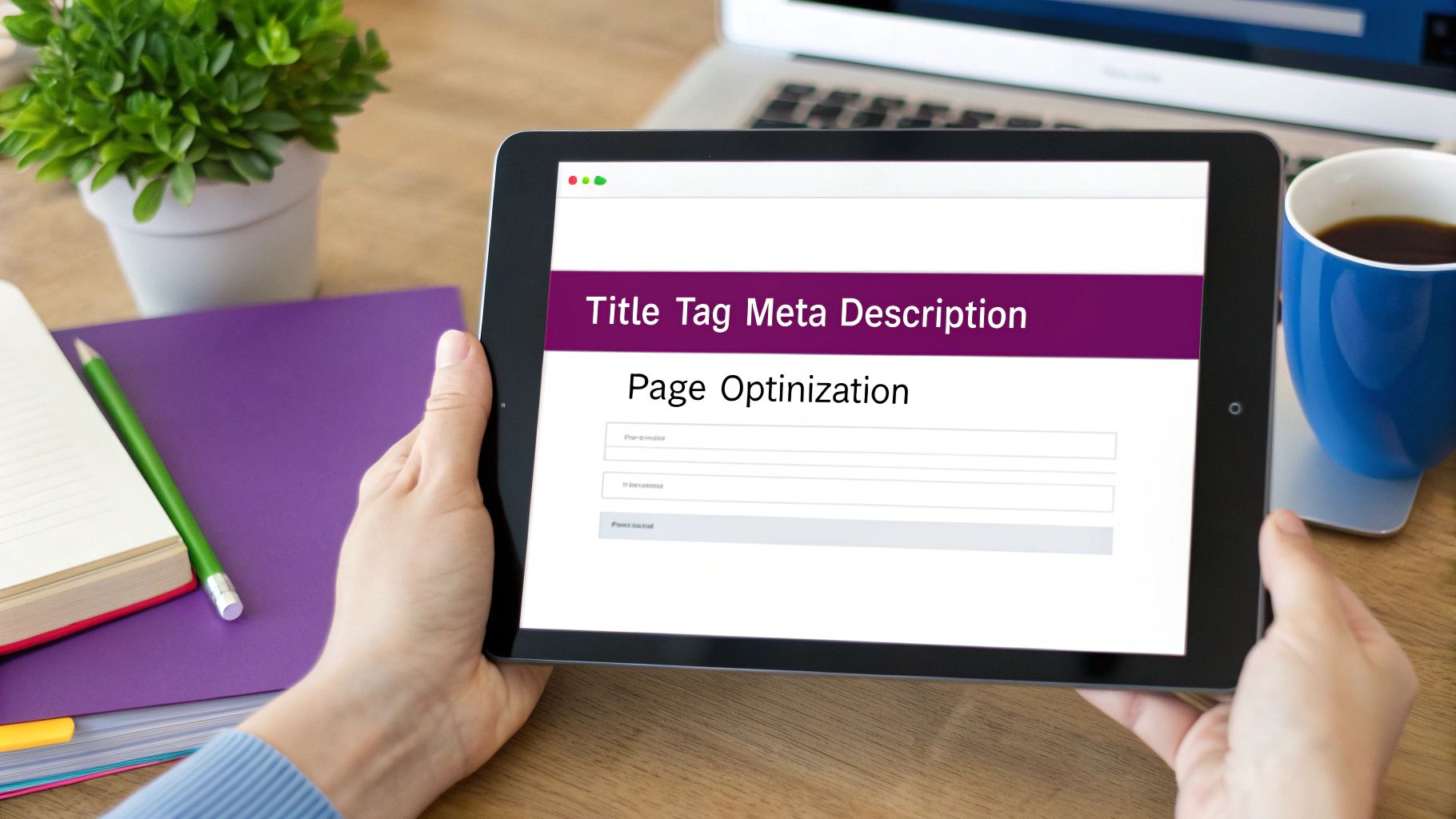
Now, this isn't about awkwardly stuffing keywords into pages. It’s about creating genuinely useful content that naturally incorporates the phrases people actually use when they’re looking for legal help, like ‘conveyancing solicitor in Leeds’ or ‘family law advice in Nottingham’. The goal is simple: prove your relevance to a specific geographical area.
You really can't overstate how important this is. Local search is a massive driver of business, with studies showing that local and organic searches combined push a staggering 69% of all digital traffic to businesses with a physical location. Just getting local search right can account for nearly a quarter of all your website visits, and that number keeps climbing as more clients rely on location-specific queries.
Weaving Locality into Your Service Pages
Your core service pages are prime real estate for local optimisation. Every single one, whether it’s for property law, employment disputes, or wills and probate, should be tailored to the communities you serve. This means you need to go far beyond a generic description of the service.
Think about how you can frame your expertise within a local context. Instead of a bland title like "Our Conveyancing Services," a much more powerful, localised version would be "Expert Conveyancing Solicitors in Leeds."
This same logic should be applied throughout the page:
- Headings: Use subheadings like "Navigating Leeds Property Law" to reinforce your local expertise.
- Body Text: Don't be afraid to mention local landmarks, specific boroughs, or legal challenges that are common to the area.
- Meta Descriptions: Make sure the snippet that appears in the search results includes your location. It’s a huge factor in getting that local click.
Creating Dedicated Pages for Each Office
If your firm operates from multiple locations, a single 'Contact Us' page just won't cut it. This is a common mistake that seriously dilutes your local signals and confuses search engines. The most effective strategy is to create a unique, dedicated landing page for each physical office.
Each of these location pages needs to be a standalone hub of information, completely distinct from the others. It must feature:
- Unique NAP: The specific Name, Address, and Phone number for that office.
- Embedded Google Map: A map pinpointing the exact location.
- Localised Content: A description of the office, the team members based there, and the specific services they offer.
- Local Testimonials: Reviews from clients who have used that particular office.
This approach gives each of your locations a fighting chance to compete effectively in its own local search market. Creating powerful, location-specific content is a detailed process, and you can get a deeper understanding by reading our guide on optimising service area pages for SEO.
Building distinct, content-rich pages for each office is the single most important on-page strategy for multi-location firms. It tells Google you have a genuine, established presence in each community you serve.
Strengthening Local Signals Across Your Site
Beyond your specific service and location pages, you can embed local signals across your entire website to really hammer home your geographical relevance. These small details add up, painting a very clear picture for search engines.
A great place to start is your website's footer. Make sure your firm's primary address and phone number are clearly visible there, so they appear on every single page. That consistency is a powerful trust signal.
You should also think about creating blog content that speaks directly to the legal concerns of your community. A post titled "What Recent Cambridge Council Planning Changes Mean for Homeowners" is infinitely more valuable for local SEO than a generic article on planning permission. This kind of hyper-local content positions you not just as a solicitor, but as an invested local expert, attracting highly relevant search traffic and building genuine community trust.
Building Authority Through Citations and Reviews
In local SEO, trust is the currency that matters most. Once your website is optimised and your Google Business Profile is humming along, the real work begins: building authority and reputation across the web. This comes down to two powerful pillars: consistent business listings, known as citations, and genuine client feedback in the form of reviews.
Think of citations as digital breadcrumbs scattered across the internet. Each one is a mention of your firm's Name, Address, and Phone number (or NAP for short). When these listings pop up in various online directories, they signal to Google that your firm is a legitimate, established business at a specific physical location. And when it comes to NAP, consistency is everything.
The Critical Role of NAP Consistency
Even the tiniest variation in your firm's details can throw a spanner in the works. For example, if one directory lists you as "Smith & Jones Solicitors" while another has "Smith and Jones Law," that’s enough to confuse search engines. This kind of mismatch dilutes the authority of your listing and can drag down your local rankings.
Every single citation must be a perfect mirror of the information on your Google Business Profile and your website. We’re talking about the details people often overlook, like using "St." versus "Street" or "Suite" versus "Ste.". Meticulous consistency sends a clear, powerful signal to Google that you are exactly who and where you say you are.
Securing High-Value Local and Legal Citations
Not all directories are created equal. You need to focus on building a presence in reputable, high-authority directories that are directly relevant to your location and your profession. A good strategy is to start with the big data players before moving into the more specialised legal directories.
Here’s where you should focus your efforts for UK solicitors:
- Major Data Aggregators: Platforms like Foursquare are a crucial starting point because they feed information to hundreds of other apps and directories.
- Well-Known Local Directories: Think Yell, Yelp, and Thomson Local. These are household names that both your potential clients and search engines already trust.
- Legal-Specific Directories: Getting listed on sites like The Law Society, Avvo, and Justia is non-negotiable. These signal to Google that you're a recognised authority in the legal field.
To help you get started, here are some of the most valuable citation sources for law firms operating in the UK.
Top UK Citation Sources for Solicitors
| Directory/Platform | Type | Key Benefit |
|---|---|---|
| The Law Society | Legal-Specific | The official directory, offering immense trust and authority. |
| Yell.com | Local Directory | A highly trusted UK business directory with a massive user base. |
| Yelp | Local Directory | Strong for user-generated reviews and local discovery. |
| Thomson Local | Local Directory | Another long-standing and reputable UK business directory. |
| Foursquare | Data Aggregator | Feeds data to countless other apps, amplifying your reach. |
| Scoot | Local Directory | A well-established network of UK business directories. |
| 192.com | Local Directory | Popular for finding people and businesses in the UK. |
Building these out manually can be a grind, but it’s absolutely vital for a strong local SEO foundation. For a much deeper dive into where to get listed, our ultimate guide to high-authority directory submissions provides a comprehensive list of valuable platforms to target.
Citations are the foundational layer of your firm's off-site local presence. Getting them right builds a stable, trustworthy signal that underpins all your other local SEO efforts.
Turning Client Feedback into Your Best Marketing Asset
Citations prove you exist; reviews prove you're good at what you do. In the legal world, where trust is everything, online reviews are the modern-day word-of-mouth referral. In fact, a steady stream of positive feedback on your Google Business Profile is one of the most powerful local ranking factors there is.
The trick is to have a proactive, yet ethical, strategy for generating them. You can't just sit back and hope happy clients will take the time to leave feedback. You need a simple, professional process to encourage them. This could be as straightforward as a polite follow-up email after a case concludes, with a direct link to your Google review page.
Responding to Every Review Professionally
Your job isn't done when a review is posted. Responding to all feedback—the good, the bad, and the neutral—is non-negotiable.
- For positive reviews: Thank the client by name. Mentioning the specific service they received (e.g., "We were pleased to assist with your conveyancing") can subtly add relevant keywords to your profile.
- For negative reviews: Act fast. Respond professionally and with empathy. Acknowledge their concerns without getting defensive and always offer to take the conversation offline to find a resolution.
How you handle criticism is a public demonstration of your firm's commitment to client care. A thoughtful, constructive response to a negative review can often be more powerful than a dozen glowing ones, showing potential clients that you’re accountable and dedicated to getting things right. This approach transforms your reviews section from a simple star rating into compelling social proof that actively wins you new business.
Creating Content That Connects with Your Community
Effective local content does so much more than just rehash legal concepts; it gets right to the heart of the specific, pressing issues your community is facing. To really get a grip on local SEO for solicitors, your content has to position your firm as the go-to local expert—the first place people in your town turn to for legal clarity.
This means you need to stop writing generic blog posts and start creating resources that have genuine local value. Let's be honest, generic content just gets lost in the noise. But hyper-local content? That speaks directly to the people you actually want to attract. It proves you understand their world because you're a part of it.

This approach doesn't just pull in highly relevant search traffic; it builds real, authentic trust. When someone sees you writing about their local council, their specific court system, or a planning issue down their street, you stop being just another solicitor. You become a trusted local authority.
Brainstorming Hyper-Local Content Ideas
The trick is to start thinking like a local. What legal questions pop up from day-to-day life in your specific town or city? What unique challenges are people dealing with? Your content needs to deliver the answers.
Here are a few powerful, hyper-local ideas to get the ball rolling:
- Property Law: You could put together a detailed guide on how recent planning changes from the local council will affect homeowners and property developers in your area.
- Family Law: Think about an article titled, "A Guide to Navigating the Manchester Family Court System," packed with practical tips and information specific to that court.
- Employment Law: What about a resource that explains the impact of a major local employer’s recent redundancy announcement, outlining workers' rights under UK law?
- Wills and Probate: You could publish a piece on inheritance tax implications for property owners in a specific high-value area, like Cheshire or Surrey.
Topics like these are gold because they have very little competition and target an audience with an immediate, location-specific need. This targeted approach is a cornerstone of effective content marketing for local businesses. To dig deeper, you can explore these advanced content marketing strategies for local SEO to really build out your plan.
Going Beyond Legal Explainers
While articles on niche legal topics are vital, your local content strategy should be even broader. You can build significant authority—and earn some fantastic local backlinks—by creating content that serves the community in other ways. It’s a great way to show you’re truly invested in the area.
Consider developing a local resource guide. Something like "A Directory of Family Support Services in Birmingham" or "Key Contacts for Small Business Start-ups in Leeds." These guides become invaluable references that other local organisations and websites will be more than happy to link to.
Writing about your firm's involvement in community events is another excellent strategy. Sponsoring a local charity run or participating in a community fair isn't just good for the soul—it's a fantastic content opportunity that reinforces your local identity.
Collaborating with Other Local Businesses
Finally, don't try to do it all in a silo. Teaming up with other respected local businesses can seriously amplify your reach and build your authority. A joint webinar with a local estate agent on the conveyancing process or a guest article for a local accountancy firm's blog can introduce your expertise to a whole new—and highly relevant—audience.
This kind of collaboration strengthens your local network, drives valuable referral traffic, and creates natural backlink opportunities. By embedding your firm deeply within the community's fabric, your content becomes more than just marketing. It becomes a genuine service, cementing your reputation as the trusted local legal expert.
We Get Asked This A Lot
Jumping into local SEO often brings up a few questions, especially for busy solicitors who need to know their time and money are being well spent. Here are some of the most common queries we hear, answered plainly.
How Long Until I See Real Results From Local SEO?
While you can see some early traction from tuning up your Google Business Profile in just a few weeks, a proper local SEO strategy for solicitors is a long game. It’s not about quick tricks; it’s about building lasting authority.
Realistically, you should expect to see significant improvements in your local rankings and, more importantly, in qualified client enquiries within three to six months. That timeframe isn't set in stone, though.
Several factors come into play:
- The Local Competition: How hard are other law firms in your practice area and city already pushing their SEO?
- Your Starting Point: Are you working with a brand-new website or one that already has some credibility with Google?
- Your Consistency: How regularly are you publishing content, building citations, and getting new reviews?
Think of it like pushing a flywheel. The first few pushes are tough, but each new piece of content, every positive review, and all your consistent directory listings add momentum. Over time, that momentum builds, and your position strengthens.
Should My Firm Focus on Local SEO or General SEO?
For almost any solicitor's practice serving a specific town, city, or region, the answer is simple: local SEO has to be your number one priority. Your most valuable potential clients aren’t just searching for "divorce solicitor"—they’re searching for "divorce solicitor in Sheffield."
Local SEO is specifically designed to put you in front of that high-intent, geographically-focused audience. It's about being the answer when someone needs legal help right where they are.
That’s not to say general SEO is useless. It absolutely has a supporting role in building your website's overall authority and trust, which helps your local performance. But when it comes to direct client acquisition and getting the best return on your investment, a rock-solid local foundation is where you must start.
Can I Handle This Myself, or Do I Need to Hire an Agency?
This is the big question, and the right answer really depends on your firm’s time, budget, and comfort level with the technical side of things.
Doing the basics of local SEO in-house is definitely possible, especially for a smaller firm or a solo practitioner. Things like keeping your Google Business Profile updated, asking happy clients for reviews, and writing the odd blog post about a local issue are all manageable.
The catch is that local SEO is a specialised field, and the rules are always changing. A good agency brings years of expertise, powerful tools, and a proven process that often gets you better results, faster. They take care of the heavy lifting—like technical citation audits, schema markup, and deep competitor analysis—so you can focus on practising law.
It really boils down to an honest look at your internal resources. If you have the time and the drive to learn, the DIY route can work. If your main goal is to get results as efficiently as possible, partnering with a specialist agency is the smarter move.
What’s the Best Way to Handle SEO for Multiple Office Locations?
This is where many multi-office firms trip up, and getting it right is crucial. The golden rule is to treat each office as its own separate entity. Lumping them all together under one profile will just confuse search engines and water down your ranking potential for every location.
Your strategy needs to cover these bases:
- Separate Google Business Profiles: Each physical office needs its own distinct, fully fleshed-out Google Business Profile. No exceptions.
- Dedicated Website Pages: Build a unique location page on your website for each office. This isn’t just a simple contact page; it should be a rich, standalone resource.
- Localised Content: Every location page must have the specific name, address, and phone number (NAP) for that office, an embedded Google Map, and content that’s genuinely local, like bios for the staff based there and testimonials from local clients.
This careful, office-by-office approach is non-negotiable. It allows each of your locations to compete effectively in its own local market, giving you the best possible visibility across all the communities you serve.
Ready to see how a specialist SEO strategy could transform your firm's visibility and bring in more clients? At Bare Digital, we offer a free, no-obligation SEO Health Check to show you exactly where your opportunities lie. Get your free SEO audit today.


